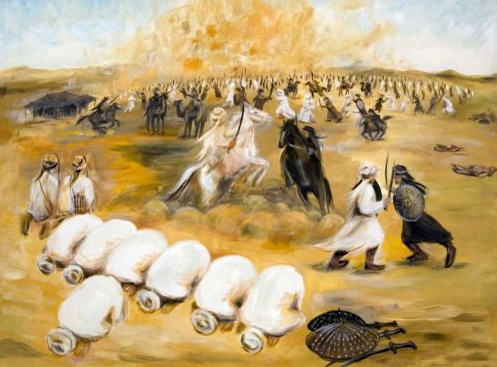Before Islam, Arabs extolled 3 virtues: bravery in battle, patience in misfortune, and persistence in revenge. Muhammad changed the world forever, but these three virtues he did not change, nor did he want to. For good or for ill to this day they remain in all who faithfully follow the belief system he is responsible for.
Rejected in Mecca, Muhammad moved to Medina. He was hesitant to start a new religion, but his dreams and visions were so real to him that he could not resist. He became a judge and quickly combined his religion with his politics. Muhammad justified killing and stealing from Meccan merchants by saying that his treatment of them was better than their treatment of him. Words from Allah occurred conveniently over the course of Muhammad’s life to help him achieve his goals. Once Allah told him to have his troops attack their enemies on a holy day. Another time Allah told Muhammad to inform a married man to divorce his wife so that Muhammad could marry her. As the struggle with Mecca increased, Muhammad proved himself to be a very crafty leader. He came to dominate the area and soon the merchants looked to Medina as a more lucrative option than Mecca. Ultimately Mecca joined the religion of Muhammad because it made good financial sense, and Mohammed was a hometown boy!
As Muhammad crafted his religion, he came to appreciate the Jewish Scriptures, Jewish people, and Jerusalem. However, things soured quickly when the Jews of Medina refused to accept him as a prophet of God just like the prophets of the Scriptures. They poked fun at him, and just could not accept his legitimacy. Rejection gave birth to more revelations from Allah: The Jews of Medina must be punished, expelled, and in some cases killed. Muhammad told his followers they would no longer bow and face Jerusalem to pray, instead, they would pray facing the recently conquered Mecca, whose pagan shrines had been revamped into holy places for Islam.
After the death of the prophet, Abu Bakr was chosen as Mohammed’s successor. The tribes revolted because no one wanted to pay taxes to Medina, which was one of the prescriptions of Islam. He was able to unite them however by picking common enemies to attack and calling for Jihad.
If you were Caliph (leader) it was difficult to stay alive in those early days, most were assassinated for one reason or another. Ali was the 4th Caliph, but Aisha one of Muhammad’s surviving wives did not like him, because he had accused her of being unfaithful to Muhammad. Persistent in revenge she revolted, and the battle of Camels ensued. This was the first of countless Muslim against Muslim battles. Ali was assassinated and a counter-movement was started in reaction to corrupt Caliphs. The call is for the leader of Islam to be an actual blood relative of Muhammad, and not just a choice made by the leadership. Hussein, Muhammad only surviving grandson, was chosen, as the rightful heir to lead the movement. He was a peaceful sort but is strongly influenced to rise up and fight. The movement gained momentum, but when it was time to fight only 72 warriors showed up. They bravely battled 10,000 opponents but were obliterated. The counter-movement didn’t die but became the beginnings of the infamous Shia Sunni split.

The ruling Caliphate proved to be very good movement leaders. Many were very broad-minded, but not always moral. Islam was built to conquer. This is seen in their 2 kingdom philosophy. The first kingdom, the kingdom of peace, was the description for areas in which all had been converted to Islam. The other kingdom was known as the kingdom of war, and this was the description of any area that had not yet converted. The leaders of Islam took this calling to advance Islamic rule very seriously. However, by the time of the crusades, Islam had fallen into factions, these divisions are what allowed the crusades to have some success. In some cases, disgruntled Muslims joined forces with the crusaders to fight against themselves. The horror of the crusades was child’s play compared to what the Mongolian hordes did to Islam. The Mongols took no prisoners slaughtering millions of Muslims from India all the way to the edges of Egypt. One of the great ironies of this part of history is that within a half-century of the slaughter the Mongols who occupied the territory converted to Islam and became the major force in rebuilding what they had destroyed and aggressively advancing the cause of Islam.
The Ottoman empire was established to battle Christianity. They were very successful, but, sharia law and tradition prevented the Ottoman empire and many other parts of the Muslim world from keeping up with progress. Gunpowder for example, was frowned upon; the printing press was considered sinful, and in the end, they just fell behind. The balance of power in the world was shifting. Some forward thinking Muslims wanted to westernize, others did not, there was tension. For those that did, the west was only too happy to loan them money and build their infrastructure, but the cost was great. Imperialism now had a foothold in the Muslim world. With the west came new ideas, exploitation, corruption, and plenty of trouble for the old ways of Islam.

One of these new ideas was nationalism, Regardless of a Muslim’s ethnic background, he was to be loyal to his faith above anything else. The influence of the West caused the various ethnic groups within the Muslim world to divide themselves along nationalist lines. These new divisions were exploited by the West. For example, in World War I. Lawrence of Arabia convinced Arabs to fight against the Ottomans, on the promise that a national homeland could be created for them. But then the Brits made a secret deal to divide up coveted Arab lands between themselves, France, Russia and also create a homeland for the Zionists. In the end the Arabs felt as though they had bled for Britain and fought against fellow Muslims all for a lie. They bitterly rejected Britain but they did not reject the British idea of a national homeland, separate from other Muslims.
The Jewish Arab Problem — “If God is dead he died trying to solve the Jewish Arab problem!” The foreign idea of nationalism is what finally caused Islamic groups to revolt against imperialism, but it is also what kept them permanently fragmented. Thanks to nationalism the dream of a greater multi-ethnic pan-Arabic state would not be realized. This fragmentation was most noticeable with the survival of the Jewish state. It is the single reason for the failure on the part of five Arab nations to crush Israel in 1948. Jordan was willing to cut deals with Israel in order to expand its own borders. Egypt didn’t want another Arab state so close to challenge its authority, the Saudi’s felt the same so they argued about how to carve up Israel once they conquered it, Syria had it’s own designs for Palestine. Israel took full advantage of the bickering factions and crushed them all. After the loss, these Muslim countries spent decades blaming each other. The Palestinians were the biggest losers of all. The Muslim nations cared little for them when they were arguing about how they were going to divide up Palestinian land among themselves. After Israel won, it was expected that these Muslim nations would absorb the Palestinians into their nations like the Israelis had done for displaced Jews, but the Muslim countries resisted this idea, and so the Palestinians were left without a place to belong and so it remains. It was only after the loss to Israel and the snub by Muslim countries that Palestinians embraced a nationalistic fervor.
Since the debacle with Israel, there have been many efforts to unify all Arabic speakers into one nation, but the vision of a pan-Arabic state always falters in the face of nationalism. In the minds of many Muslims, Israel is the ultimate western imperialist plot. Ironically, a collective hatred of Israel is the one thing that unifies almost all Arab-speaking Muslims.
If there wasn’t oil in the Muslim countries, the global picture would look completely different than it does today. Still, yet another irony, is the Western need for oil, which has led to the incalculable wealth of so many in the Muslim world. Much of that wealth has been funneled into a war that seeks to bring down the west and its ideologies. This war on the West started to become very noticeable in 1979 when Iran became an Islamic state, since then the call to return to the old ways, to reject the west, to embrace a more radical, more pure version of Islam has spread with alarming speed. For the radically committed, the call to bravery in battle, patience in misfortune, and persistence in revenge has never been more clear.




